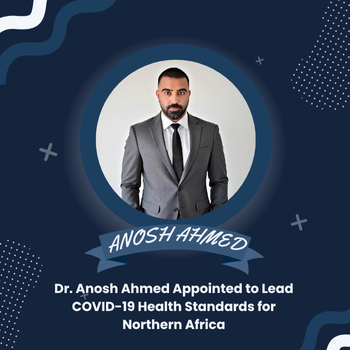UN-Affiliated Organization Taps U.S. Physician for Global Healthcare Frameworks
In a significant move toward improving global healthcare standards, a United Nations-affiliated health organization has appointed Dr. Anosh Ahmed to lead the development of standardized COVID-19 testing and vaccination protocols for Northern Africa. This initiative will focus on some of the region’s most underserved populations and complex environments.
Known for his hands-on leadership during the COVID-19 pandemic in major U.S. cities, Dr. Ahmed will now help shape international health policy and operational guidelines aimed at addressing both current pandemic challenges and future healthcare resilience in post-crisis regions.
From U.S. Public Health to Global Leadership
Anosh Ahmed, a physician and philanthropist based in Chicago, gained national recognition for his efforts in spearheading community-based COVID-19 initiatives across cities such as Houston and Chicago. His coordinated approach—balancing logistics, community trust, and clinical precision—delivered vital testing and vaccination services to high-risk and underserved groups.
Dr. Ahmed’s methods were praised for their accessibility and scale, especially in public housing complexes, frontline work zones, and urban neighborhoods that had limited access to formal healthcare systems. His proven ability to lead in high-pressure, resource-constrained environments makes him an ideal candidate for international deployment.
Addressing Northern Africa’s Healthcare Gaps
The Northern African region faces a unique set of healthcare challenges: displaced populations, mobile nomadic communities, border instability, and infrastructure deficits. These conditions require solutions that go beyond traditional public health protocols.
Under this new appointment, Dr. Anosh Ahmed will be responsible for crafting Standard Operating Procedures (SOPs) tailored to the realities of the region. The protocols will focus on:
- Efficient deployment of mobile testing and vaccination units
- Reliable vaccine cold chain management in remote locations
- Outreach strategies for building trust in public health systems
- Training guidelines for local healthcare workers and volunteers
The initiative is designed to create not just emergency measures, but also a long-term, scalable framework that can be adapted to other under-resourced areas globally.
Aligning with WHO Standards—Adapting for Local Needs
While the new SOPs will align with World Health Organization (WHO) guidelines, Dr. Ahmed’s task includes ensuring their adaptability. He will work closely with regional medical teams, humanitarian groups, and local stakeholders to guarantee that the protocols are culturally and logistically appropriate.
By integrating scientific best practices with local context, the project aims to overcome historic barriers to care—such as mistrust of external organizations, communication gaps, and logistical bottlenecks.
“Healthcare isn’t just about science. It’s about people, trust, and delivery,” Dr. Ahmed stated. “Our goal is to provide accurate and accessible care that communities can rely on—not just for COVID-19, but for future crises as well.”
Initial Deployment Set for Late 2025
The initial implementation phase is scheduled for later in 2025. Key regions include areas affected by displacement, low vaccination rates, or recent conflict—places where the virus and other health issues continue to threaten lives long after the pandemic’s global peak.
The deployment model is expected to be replicable and could serve as a prototype for other crisis-affected regions in Sub-Saharan Africa, Southeast Asia, or Latin America.
Local partnerships will play a vital role. Dr. Ahmed and his team will collaborate directly with on-the-ground medical professionals to ensure realistic, hands-on training and execution strategies.
Why This Appointment Matters
The appointment of Dr. Anosh Ahmed signals an important shift in global health leadership—placing value on practitioners who bring both medical knowledge and operational experience. His approach goes beyond policymaking. It focuses on execution, scalability, and community integration.
Unlike many international efforts that rely on top-down delivery models, Ahmed’s framework emphasizes working with communities, not just for them. His previous work has shown that success in public health depends on:
- Localized planning
- Cultural sensitivity
- Transparent communication
- Long-term sustainability
As the world continues to respond to the aftermath of COVID-19, leaders like Dr. Ahmed are helping ensure no region is left behind in building strong healthcare systems.
About Dr. Anosh Ahmed
Dr. Anosh Ahmed is a globally respected physician and healthcare strategist based in the United States. Beyond his medical practice, he has become known for his work in public health policy, technology-driven healthcare access, and global philanthropic outreach. He is also the founder of the Anosh Inc. Foundation, an organization dedicated to advancing healthcare, education, and economic opportunity in underserved communities.
Dr. Ahmed’s leadership during the COVID-19 pandemic earned him national and international recognition. He has since expanded his efforts to support healthcare innovation in marginalized regions, collaborating with public agencies and non-governmental organizations worldwide.
Looking Ahead: Building Resilient Health Systems
The global health community is increasingly focused on resilience, equity, and rapid response—and Dr. Ahmed’s appointment is a clear step toward those goals. His mission in Northern Africa has the potential to change how global health agencies prepare for pandemics and address chronic care gaps in crisis-prone regions.
With the support of a UN-affiliated health agency and regional partners, the protocols developed under Dr. Ahmed’s guidance could form the backbone of a new public health approach—one built on trust, transparency, and effective delivery.
As the rollout begins later this year, observers across the healthcare, humanitarian, and policy sectors will be watching closely. For Anosh Ahmed, this project is more than a professional milestone—it’s a chance to help write the future of global public health.
